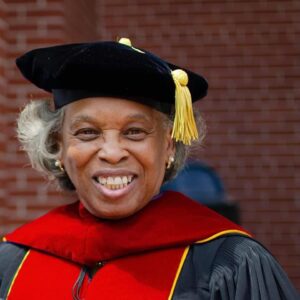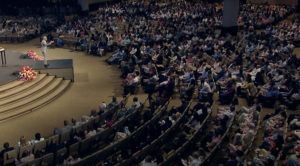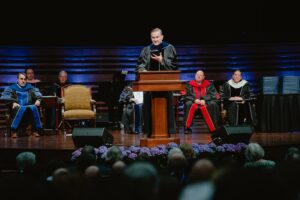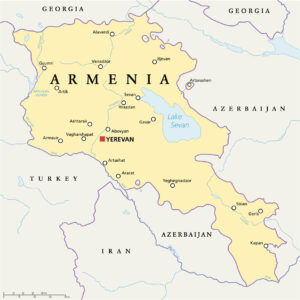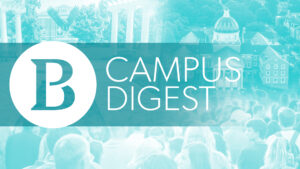
LIBERTY, Mo. (BP)–For homosexuals to find acceptance on college campuses, schools need to offer support through sanctioned organizations, advocates reason. While the practice has taken root in most secular schools and many religious ones, the idea is new to Southern Baptist colleges. Supporters see it as a sign of encouraging diversity. Critics fear further erosion of biblical standards.
The debate is taking shape at William Jewell College in Liberty, Mo., now that faculty advisor Mark Cadd has announced plans to seek formal recognition of a homosexual support group next fall. “It is time to allow the same amount of visible support as any other groups,” Cadd, director of the college’s Center for Educational Diversity and an assistant professor of German, told The Kansas City Star in May.
In a front-page article, the newspaper reported on efforts to form such a group led by a student who won Jewell’s highest academic honor this year. Until then, the homosexuality issue had been “subterraneous,” with only three or four people involved, stated Ray Jones, Jewell’s executive director of college relations, in an interview with Baptist Press. He said he believes The Kansas City Star article unfairly implied a “highly visible and active debate” is raging on campus.
Jones said no formal request for any type of college-recognized support group for homosexuals had been made. “If that does happen, it may be treated as a special issue put before the trustees,” he predicted.
The relationship Southern Baptists in Missouri have with William Jewell College is not as strong as ties to other Baptist schools in the state. Hannibal-LaGrange College, Southwest Baptist University and Missouri Baptist College are governed by trustee boards appointed by the state Baptist convention. With Jewell receiving support from both Southern Baptists and American Baptists, its trustees are appointed by the trustee board, with an understanding that most faculty and trustees will be Baptist. In funding, Jewell receives about $1 million a year from the Missouri Baptist Convention, Jones told The Kansas City Star.
Jewell’s religious heritage, as Jones put it, provides “a star to navigate by and a means to reinforce personal and spiritual growth.” But that same tradition provides “a value system which excludes persecution,” he was quick to add.
“We have not dealt with situation here,” stated Tom Dugger, vice president for business and student affairs at Hanibal-LaGrange, calling the circumstances at Jewell “unfortunate.”
Neither Southwest Baptist University nor Missouri Baptist College offer support groups for homosexuals. Paul Huse, Missouri Baptist College’s director of public relations, said he cannot ever imagine the school offering that kind of encouragement to promote a homosexual lifestyle.
Support for homosexuality, William Jewell’s Jones reflected, will naturally arise in a liberal arts setting “where a part of the school’s mission is to uphold the standards of free inquiry, fairness and understanding.” And, he noted, “students cannot be artificially isolated from people or ideas.”
William Jewell College sponsored a forum last March to offer answers to questions about the Bible’s perspective on homosexual issues. Two Midwestern Baptist Theological Seminary professors defended the traditional scriptural view of homosexuality as sinful behavior. Support of a pro-homosexual perspective came from Paul Smith, pastor of Broadway Baptist Church in downtown Kansas City, and and Marsha Fleischman, a minister at the church.
For more than two hours, Midwestern profs Terry Wilder and John Howell faced an active crowd of about 120, most of whom reportedly were not Jewell students, but who came from Broadway Baptist Church and the community. Smith, in his comments, apologized for condemnation homosexuals had experienced from Baptists, saying he had changed his theology and repented and now believes “God calls gays and non-gays.”
Wilder told the audience he did not expect “unregenerate reasoning should accept argumentation from Scripture.” He expressed a hope after the forum that the discussion helped correct “popular, yet gross misunderstanding that the Bible condones and approves of homosexual relationships.”
The campus newspaper, Hilltop Monitor, in addition to covering the forum, editorialized in favor of greater tolerance. Noting the school community has a long way to go “before truly accepting diversity and promoting love for all of God’s children,” editor Natalie Nimmer encouraged movement toward a goal of nonjudgmental love. “By speaking out for what is right and realizing all people are different,” she wrote, “we can create a positive change that will promise tolerance, acceptance and love.”
One letter to the editor praised faculty advisor Cadd’s push for a homosexual support group through campus publications and the school’s Internet web site. The Jewell alumna described herself as a lesbian married to another Jewell alumna, “cheering wildly the courageous efforts” of Cadd. Previously, any mention of homosexuality was spoken “in derogatory tones and joked about by the misinformed and the bigoted,” the alumna wrote. “Discrimination, be it racism, misogyny, extreme sectarianism or homophobia, is antithetical to academic principles.”
William Jewell’s Center for Educational Diversity assists other types of school-endorsed organizations such as a Black Students Association and a group for international students. “They don’t pursue a radical agenda, but are more of a social service organization,” Jones said of the Black Students Association. The international students, meanwhile, meet primarily for fellowship, he said.
The Center for Educational Diversity was established under the auspices of William Jewell’s Office of Student Affairs, with access to a house for gatherings. “For the most part, it was conceived as having a racial focus,” Jones said, adding the issue of support for homosexuals had only recently been raised. Cadd was appointed as the center’s director by the student affairs office.
In regard to Cadd’s push for a college-sanctioned homosexual support group, Jones said, “In this instance, at least, and possibly others, his comments and actions have been representing himself and not necessarily the college. …In dealing with anybody reasonable, (that explanation) is enough.”
Jones nevertheless is finding himself responding to numerous letters from critics who oppose the creation of a campus support group. Jones said he believes The Kansas City Star did a disservice to the public and the college by “characterizing the climate at Jewell based on the perception of a very few people who do not represent the position of the college.” Among the inaccuracies Jones found was a reference to a former professor having been rejected for tenure after confiding his AIDS-related problems to a supervisor.
“The article also left the impression that William Jewell had acted or might act soon to provide some type of official recognition for a gay and lesbian support group,” Jones continued. “It would be a contradiction of our mission to take steps which might be perceived as actively promoting a gay or lesbian lifestlye.” Such action would run counter to basic values which have guided the school since its founding in 1849, he added.
Jones said the college wants to create a climate in which all students feel comfortable and receive the counseling and support they need. “That doesn’t mean every student or student group needs a formally recognized support group.
“We’re trying to be concerned here about fairness and support for everybody,” avoiding persecution or stigmatization of certain individuals, he said.
Church-state law expert Mike Whitehead, in an interview, said a private religious college must be free to teach its religious convictions. The assistant professor of church and law at Midwestern Seminary said a school may require students and staff to show character and conduct consistent with these convictions.
“There is no legal duty for a private religious school to allow homosexual student groups to be recognized or to operate on campus. Public colleges, funded with tax dollars, are held to different standards and constitutional duties, including giving equal access to various student groups, including homosexual advocacy groups,” Whitehead said. “That’s why Baptist colleges remain private, so that Baptist campuses may reflect biblical values.”
Jones said there is no “litmus test for students and faculty” at William Jewell, adding, “I could not foresee us having one.” He said he doubts there is a workplace, college or high school in America where homosexuality is not part of the fabric. “People who think they can isolate themselves from this aspect of society are living in a fantasy world.”




